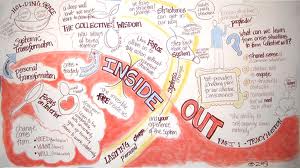Why We Should Turn Inside-Out
January 19, 2011 Leave a commentTalk of tending to our “interior condition” has been in the air and very active on this blog the past couple of weeks (see “What Love Looks Like in Action,” “Between Hope and a Hard Place,” and “Meditation for the Love of It”). In all of these posts there is a thread that makes the point that focusing on our inner selves, expressions of empathy, and cultivating mindfulness and deep connection to self and other(s) are vital to the work of transformational social change. In line with all of this, I’ve been re-reading a wonderful book that speaks about why and how we should make considerations of our individual and collective interiors central to our work.
In Inside-Out: Stories and Methods for Generating Collective Will to Create the Future We Want, Tracy Huston, coach, consultant, and founder of the Menlo Lab, speaks openly about her initial skepticism about and evolving embrace of focusing on the self. Huston enumerates the following five practical reasons why tending to our interior conditions makes sense (I have added some of my own editorial comments):
- Habits hardwire us into limited ways of being. We develop hierarchical constructs based upon experience that then inform future behavior. This is an intelligent response, and also has its down sides. When new conditions arise we are slow to see these, much less respond to them. In order to change these habits, we must be aware of them and bring intention to changing our internal constructs/mindsets.
- We base our self-worth on what we know. We tend to praise the expert. We continue to hire and anoint leaders for what they know and for their answers. This is a trap. Complexity theory shows us that certainty is dubious and that leadership is about being comfortable with not knowing. Inner work can help us get out of the pursuit of always being in the know and proving ourselves at the expense of improving ourselves.
- We are most comfortable working in silos. Our existing structures tend to keep us separate from others. Working cross-functionally and across boundaries is the call of the day, and we need to become more comfortable with the messiness that can ensue as well as the new roles and functions we may be called to fill.
- We like to hold on to territory and power over others. Research has shown that people who get into formal positions of power often do so by catering to the needs of others, but that once there, tend to protect what they have. In order to create spaces for new ways of being and organizing ourselves, those who have territory and power must be willing to build and share it. Inner work can help with this process of letting go.
- We invest in fortresses as if these will make us strong. It’s not about the physical structures and material supports. Strength comes first and foremost from the inner fortitude to commit and persist.
Pretty compelling if you ask me, and all in line with this idea that my colleague Cynthia mentioned in her post the other day, that empathy is political, that inner work is bound to real structural struggles. So what are you doing to turn things inside-out and what are you seeing as a result?

No Comments
I’m struck by “We base our self-worth on what we know.” It follows that what we know changes, our sense of self worth can be called into question. I think this helps to explain why some people have such a deeply personal response to exploring issues of power and privilege. When people see themselves as highly esteemable based in part on a misunderstanding or incomplete understanding of history and current reality, it’s hard to hear that societal factors also contributed to their success. This can call into question the basis of their accomplishments and their sense of worth.